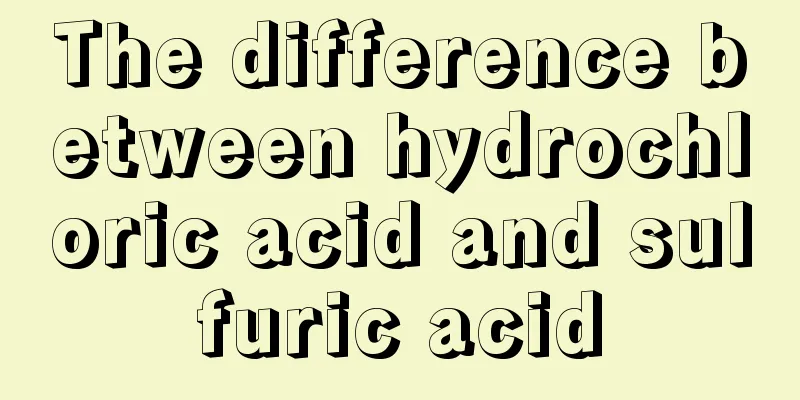The difference between hydrochloric acid and sulfuric acid

|
When you hear the word sulfuric acid, you may think of sulfuric acid as being corrosive, which can damage the skin or even disfigure it if it comes into contact with the skin. Therefore, sulfuric acid should be properly stored and kept out of the reach of children. There are certain differences between hydrochloric acid and sulfuric acid. Hydrochloric acid can be used in the food industry and metal processing industry. Sulfuric acid has applications in agriculture and explosives. Let’s talk about the difference between the two. Hydrochloric acid is an aqueous solution of HCl of varying concentrations. It is transparent, colorless or yellow, has a pungent odor and is highly corrosive. Easily soluble in water, ethanol, ether and oil, hydrochloric acid is extremely volatile. Sulfuric acid is one of the most active binary inorganic strong acids and can react with many metals. High concentration of sulfuric acid has strong water absorption and can be used as a dehydrating agent. It is highly corrosive and oxidizing and is not easy to volatilize. Concentrated hydrochloric acid is volatile and is a volatile acid, while concentrated sulfuric acid is a non-volatile acid. Open the cap of the concentrated hydrochloric acid reagent bottle, the solute in the concentrated hydrochloric acid: hydrogen chloride gas (HCl) will evaporate from its aqueous solution. When it meets moisture in the air, it will dissolve into it again and reform into many small liquid droplets of hydrochloric acid suspended in the air. To the naked eye, it appears as a white acid mist at the mouth of the bottle. Therefore, if white mist appears at the bottle mouth when you open the bottle cap, it is concentrated hydrochloric acid; if no white mist appears at the bottle mouth, it is concentrated sulfuric acid. Although concentrated hydrochloric acid and concentrated sulfuric acid both appear to be colorless liquids, their densities are different. The mass of an equal volume of concentrated sulfuric acid is much greater than that of concentrated hydrochloric acid. This results in concentrated sulfuric acid having the properties of an oily, viscous liquid. As long as you pick up the reagent bottle and shake it, the concentrated sulfuric acid will "hang on the wall", that is, it will stick to the wall of the reagent bottle and will not come off easily, and its viscosity can be easily seen. Therefore, if you shake the reagent bottle, if there is "sticking to the wall" phenomenon, it is concentrated sulfuric acid, and if there is no "sticking to the wall" phenomenon, it is concentrated hydrochloric acid. Uses of Hydrochloric Acid (1) Hydrometallurgy for rare metals (2) Used in organic synthesis (3) Used in bleaching and dyeing industry (4) Used for metal processing (5) Used in food industry (6) Used in the production of inorganic and organic drugs Sulfuric acid use (1) Ammonium sulfate for fertilizer production (2) Used in the production of chemical fibers, which are familiar to the public: viscose (3) Used in metallurgical industry and metal processing in the metallurgical industry sector (4) Used in explosives (5) Relationship with the Atomic Energy Industry and Rocket Technology |
<<: Ferric hydroxide and sulfuric acid
>>: Is the formaldehyde removal solution poisonous?
Recommend
What medicine is better for skin ulcers?
Skin diseases are very serious diseases for peopl...
The main reason for the formation of haze
Many people have found that every winter, the amo...
How to provide care for patients with small cell lung cancer
How should patients with small cell lung cancer d...
How to treat extension type supracondylar fracture of humerus
Clinically, supracondylar humeral fractures are d...
Which part of the human body ages first?
I believe that when talking about aging, everyone...
What is the probability of nasopharyngeal carcinoma recurring
After recovering from treatment, patients with na...
Feeling urethral pain after nocturnal emission
Some people feel special pain in the penis area a...
How to care for wounds after melanoma surgery
We should not underestimate melanoma. Although it...
Can I eat hard food after my teeth are straightened?
Orthodontic treatment is a very painful process b...
How long does it take before I can walk after a broken ankle
As the saying goes, health is the capital of revo...
Characteristics of back pain caused by lung cancer
Characteristics of back pain caused by lung cance...
How to treat hormone acne
Nowadays, many people wear makeup every day. The ...
What to use to clean scale
Cups, kettles and other utensils that are frequen...
Why does my left chest hurt when I breathe?
For friends who feel pain in the left chest when ...
Can gastroscopy and colonoscopy be done together?
When people go to the hospital to check their sto...









